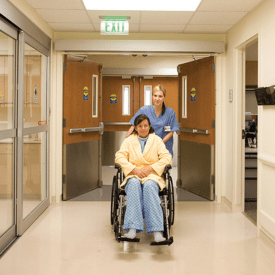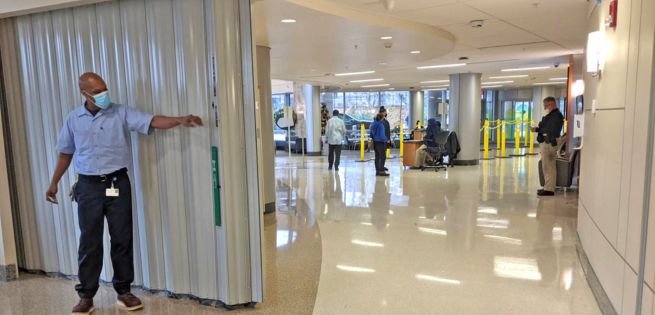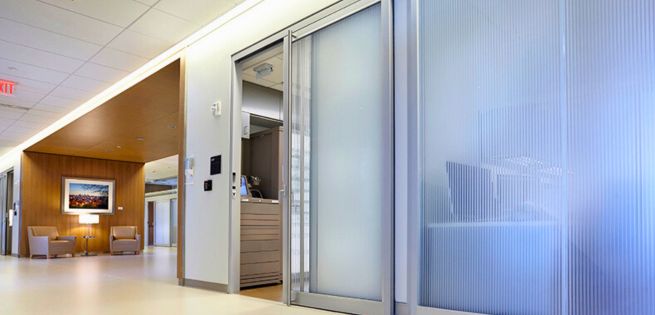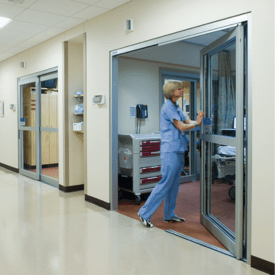Enhancing Hospital Safety: The Power of Automatic Door Features for Hospitals
February 27, 2024
There are many automatic doors for hospitals on the market today. The safety features of automatic doors can help determine how safe, secure, and accessible each hospital is.
Hospitals are some of the busiest facilities in the world, with many averaging over 600,000 people daily. That is a massive number of individuals who each require high safety and security while inside the building.
In order to protect the people visiting, working in, and seeking help from these hospitals, it is crucial to install automatic door systems that provide an array of safety features.
With so many different automatic door options and an abundance of features and tools, knowing what each building wants and needs will depend on what they already have, whether or not it is up to code, and how they would like to implement latest technologies.
What Types of Automatic Doors Are There for Hospitals?
 There are many different types of automatic doors for hospitals, each making access and safety a lot easier to manage. Some of the more popular options you can choose from include,
There are many different types of automatic doors for hospitals, each making access and safety a lot easier to manage. Some of the more popular options you can choose from include,
- Sliding doors
- Folding doors
- Swinging doors
- Revolving doors
- Fire safety doors
These doors are made from durable, high-quality materials, come in various designs, and can be custom-fitted to each room or entryway.
Hospitals can also equip each door with different features to ensure safety and security.
Importance of Safety Features in Automatic Hospital Doors
With hospitals having consistent incoming and outgoing traffic and housing seriously ill or injured patients, safety is always a concern worth investing in. If every door is not properly set up for all types of emergencies, patients, staff, and visitors are always at risk.
Companies that install automatic doors are well aware of the safety features required by code and the ones that should be added for additional safety measures.
Accessibility
One requirement that will result in consequences if overlooked is accessibility. "To determine the number of accessible entrances required, you look at all the entrances to the building, and at least 60 percent of those doors are required to serve as an accessible entrance." (iccsafe.org)
Accessibility is crucial for safety because it ensures every patient can access services and health care. When it comes to accessibility and up-to-code entrances, you also need to install safety features, such as motion sensors and wider doorways.
Germ-Free Zones
Maintaining a clean and healthy space for patients to feel safe while inside the hospital is also essential. Automatic doors with features such as touch-free entries and tightly sealed doorways can help keep the spread of illnesses at bay.
Protection from Dangers

Using the right automatic door safety features can help prevent violent attacks, vandalism, theft, and other dangerous situations from arising. Implementing features like access controls, key-card entryways, and bullet-resistant glass can protect people better than out-dated door systems.
Horizontal, accordion folding fire and security doors can also be effective in stopping intruders in their tracks and also provide the added benefit of reducing the risk of fire spreading throughout the facility.
Privacy

Privacy is also essential in hospital settings. Patients and staff provide a lot of personal information daily in healthcare facilities, from insurance to health and financial information. All of these details released should be protected from the public and those with dishonest intentions. Privacy is also needed in terms of patient privacy when they are being cared for or in a room like an ICU.
Automatic Door Safety Features for Hospitals
Whether you have an automatic sliding glass door or an automatic wooden swinging door, you must ensure these entryways are prepared for anything. This level of protection can be accomplished by using an automatic sliding door lock, access controls, sensors, and various other features.
Door Openers
There is no need for patients and staff to touch door handles and latches anymore. Automatic sliding doors, commercial style, now come with touch-free opening options to keep germs at bay. These openers also aid those with disabilities who would otherwise have trouble opening the doors.
Some of the best sliding door opener options include:
- Automatic door mats: Presence-sensing mats placed in front of the door detect incoming traffic, sending signals to the door to open.
- Motion sensors: Motion sensors are also used to detect oncoming traffic, signaling the doors to open without human intervention.
- Self-closing: Self-closing doors can be set to close slower or faster depending on where they lead, ensuring patients have plenty of time to make it through safely. It can also keep people from piggybacking to gain access to restricted areas.
Door Locks
Automatic door locks are also useful and can be programmed to lock at specific times or can lock anytime the door closes shut. Automatic locks can keep restricted areas off limits to anyone without access and ensure offices, supply rooms, or pharmacies are always secure.
Access Controls
Utilizing access control features is one of the best ways to keep tabs on everyone coming and going from a hospital and ensure everyone is accounted for at all times. It can also help prevent theft and damage by only allowing specific people into certain areas.
Some types of access control features include:
- Card key entrances: This system logs entry and exit and only allows those holding the card access.
- Electronic keypads: Only those with the code can access the area.
- Remote control operators: Provide the person with the remote control over who comes and goes.
- Sensor detection and alerts: Alerts to anyone coming and going from a room.
Features for Special Rooms
Hospitals have various automatic door safety features, with special rooms requiring additional security. These doors are designed for specific situations and ensure that possible threats or complications are considered when installed.- Air-tight seals: Pressure isolation rooms require air-tight seals to avoid contamination inside and outside the room. These features are perfect for spaces such as airborne isolation infection rooms and ICU rooms.
 Bullet-resistant glass: Unfortunately, hospital shootings do happen, and there is no way (at this time) to prevent them all. However, bullet-resistant glass doors can help protect those behind them.
Bullet-resistant glass: Unfortunately, hospital shootings do happen, and there is no way (at this time) to prevent them all. However, bullet-resistant glass doors can help protect those behind them.- Breakaway doors: These breakaway doors are often used in patient rooms and critical care units. These doors will open when pushed hard enough, offering a more expansive entryway fast.
- Opaque/tinted glass: Glass panels that provide privacy can help patients feel calm and comfortable.
- Self-closing/smoke-rated ICU/IMU/CCU doors: These doors can automatically secure an area of the hospital that is on fire, confining it to a small space.
Automatic Doors Problems
It is obvious that there are ample benefits to installing automatic sliding, swing, folding, and revolving doors in a hospital setting. However, there can be a few problems that come along with them as well.These problems will only exist if hospitals aren't educated on the door systems they choose or leave out important features that can make all the difference.
- Low-quality systems: When automatic door systems are installed in hospitals, high-quality products are essential. A professional setup will require minimal maintenance and repairs.
- Lack of features: Most hospitals will benefit from utilizing the majority of safety features available for automatic doors. If a door lacks essential locks, openers, sensors, etc., they won't provide the right level of protection.
- Insignificant instructions or knowledge: It is critical that the staff understands how to use the features to get the most benefits out of them.
- Improper care: Automatic doors are high-tech and do require a level of care and caution. If doors are misused or not maintained and never inspected, they may not always work correctly, limiting the level of security provided.
As long as a quality automatic door system is set up correctly, appropriately used, and has the best features available, there will be little problems to deal with. The positives of automatic hospital doors definitely outweigh the negatives.
Choosing the Best Features for Automatic Hospital Doors
By choosing a respectable and reliable door service company, such as Door Services Corporation, hospitals, and healthcare facilities will gain access to knowledgeable, certified, and trustworthy professionals who can help determine which automatic doors and features are best.
Having an expert on hand is one of the best ways to ensure all door systems work correctly and all features do their job 100%. This service will ensure people, information, and property are protected from threats (human or environmental) for many years.
ABOUT DOOR SERVICES CORPORATION
Your expert partner for pedestrian door service and installation, our company was built on quality products and long-term customer partnerships. We are a member of the American Association of Automatic Door Manufacturers. Our AAADM certified technicians have over 50 years of product knowledge. We service and repair all doors and windows models of all automatic door manufacturers.24/7 emergency service is available to meet your after hour needs in our designated coverage areas:
- Advanced Door Automation - North Carolina and east to the coastal regions
- Advanced Door Service - Eastern Pennsylvania, Virginia, DC, Baltimore and Northern Georgia
- Allegheny Door Enterprises - Western Pennsylvania and West Virginia
- Automatic Door Enterprises - Philadelphia, Pennsylvania and surrounding areas
- Del-Mar Door Service - Delaware
- Door Controls - Louisiana
- Door Control, Inc. - Maine, New Hampshire, Vermont and Northeast New York
- Door Concepts, Inc. - Rhode Island and Eastern Massachusetts
- Eastern Door Service - New Jersey
- Keystone Automatic Door Enterprises - Northern Pennsylvania
- Texas Access Controls - Dallas, Houston, Austin and Corpus Christi, Texas areas
- Horton Automatics of Ontario - Ottawa Valley and Southern Ontario, Canada
- Pasco Doors – Southern California
- Your Automatic Door Company - Indiana
